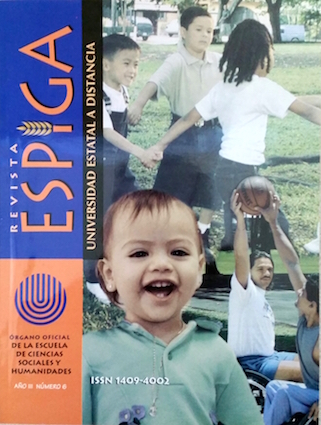Las funciones del psicólogo en una institución de educación especial privada, según las percepciones de los docentes.
DOI:
https://doi.org/10.22458/re.v3i6.772Resumen
El presente estudio es una exploración descriptiva acerca de la percepción que del "rol del psicólogo educativo" tienen los docentes de una Escuela de Educación Especial. Dicho estudio se realizó en el Instituto Andrea Jiménez. Los resultados indican una percepción positiva hacia la inclusión del psicólogo educativo en el equipo de trabajo escolar y sugieren divulgación y capacitación acerca del rol del psicólogo educativo.Citas
CORNEL, E. L. (1942) The work of the school psychologist. Albany: Division of Research, New York State Education Department. Best Practices in School Psychology, NASP, 1995.
FAGAN T. K., (1990) “Trends in the History of School Psychology in USA” (1995) Best Practices in School Psychology, cap. 5, III Edited by Thomas & Grimes: The National Asociation of School Psychologist, NASP Publications Policy Handbook, USA.
FAGAN T. K., (1993) “Separate but equal: School psychology s search for organizational identity”. Journal of School Psychology 31, pp. 3-90, USA.
FRANCA-TARRAGO, O. (1996) Ética para Psicólogos: Introducción a la Psicoética. Editorial Descleé de Brower, S.A. 2ª Edición, pp. 282-285.
FOWLER, E, & Harrison P.L., (1996) “Best Practices in continuing Professional Development for School Psychologists”, Best Practices in School Psychology, cap. 7, III Edited by Thomas & Grimes: The National Asociation of School Psychologist, NASP Publications Policy Handbook, USA.
GALLOWAY, D. (1998) “Special Education in the UK: Educational Psychologists and the Effectiveness of Special Education”. School Psychology, UK. Review, Vol. 27, pp. 77-83, USA.
GOOD T. L.& Brophy J., (1999) Psicología Educativa Contemporánea, 5ª Edición, Mc Graw-Hill, México.
HALL, M. E., (1949) “Current employment requirements for school psychologists”. American Psychologist 4, pp. 519-525, USA.
HENSON K. T. & Eller B.F., (1999) Psicología Educativa para la enseñanza eficaz, International Thomson Editores, S.A., México.
NASP, (2000) “Professional Conduct Manual: Principles for Professional Ehics”, Guidelines for the Provision of School Psychological Services.
OKLAND T.& Cunnigham J., (1989) “The Future of School Psychology: Conceptual models for Its Development and examples of their Applications”, cap. 2 “Models for Understanding School Psychologys Development and Future Trends”, pp. 34-53, School Psychology Quarterly, USA.
SANDOVAL, J. (1993) “The history of interventions in school psychology”. Journal of School Psychology 31, pp. 195-217, USA.
SHEPPARD, J. & Dawson, M. (1998) Educational and School Psychology in the UK and US: an Introduction”. School Psychology Review, Vol. 27, pp. 7-13., USA.
SPRINTHALL, N.A. & Sprinthall R.C., (1990) Educational Psychology: A developmental approach, Quinta Edition, MC GrawHill, Inc., USA.
ZIGMOND, N, (1996) “Inclusion in Pensylvannia: educational experiences of students with disabilities in one elementary school”. Journal of Special Education 29, pp. 124-132., USA.
Descargas
Cómo citar
Número
Sección
Licencia
Los artículos publicados por esta revista operan bajo licencia de CREATIVE COMMONS (Atribución-NoComercial-CompartirIgual 4.0). El Comité Editorial permite la reproducción parcial o total de los artículos a condición de que se mencione la fuente. Asimismo, los escritos podrán ser colgados y divulgados vía digital, siempre y cuando se mantenga la fuente de su publicación.
